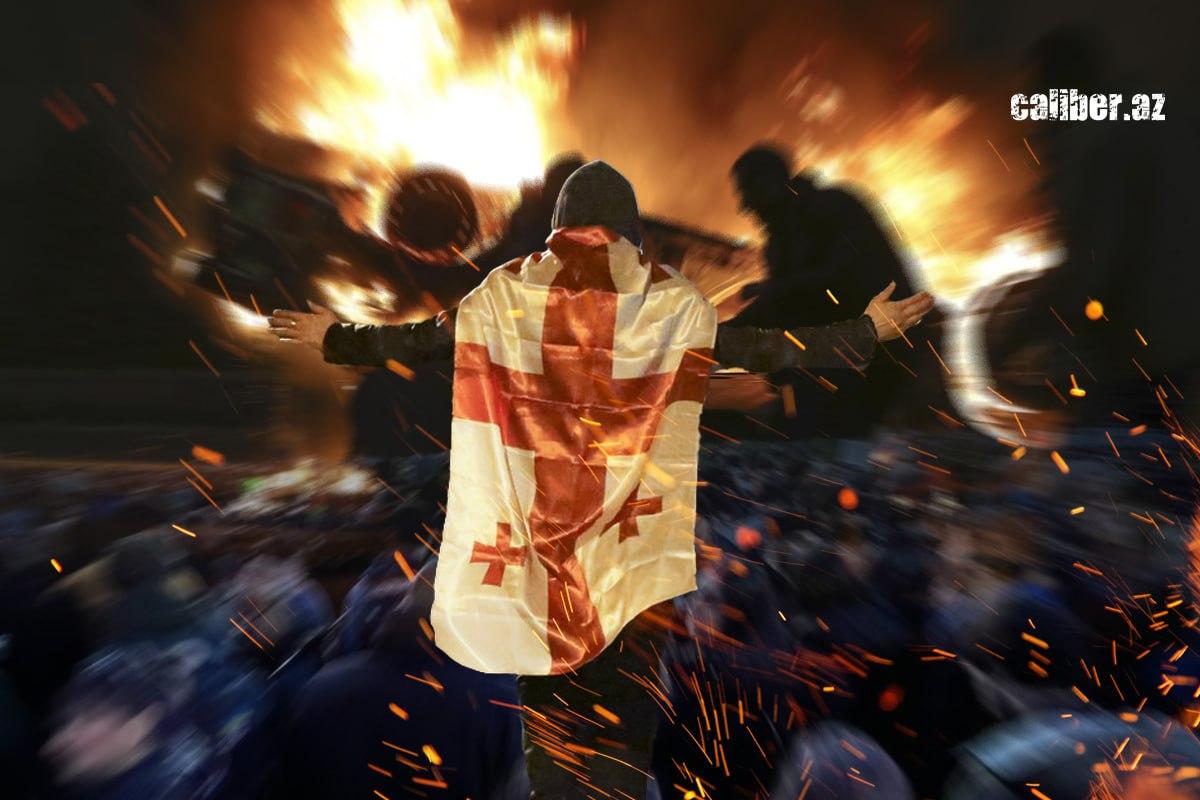Unpacking potential coup scenarios in Georgia Key developments unfold
A scenario for a possible coup in Georgia is gradually taking shape. This historical situation is unique in that it could be led by the current president, Salome Zourabichvili. Although she holds a position with very limited constitutional powers, she is already acting like an absolute dictator.
Zourabichvili has announced not only the creation of an entirely illegal "technical government" but has also prematurely declared a celebration of the "victory" of the opposition in the elections scheduled for October 26, 2024, at her residence. The scenario of the opposition's defeat and the need to accept it is something that the president of Georgia and her Western "curators" do not consider at all.
Salome Zourabichvili has specifically announced that on election day, a "coordination centre" will be operating at the Orbeliani Palace, the presidential residence and that after the election, a "victory celebration" will be held there. The Georgian Ministry of Justice summoned a representative of the president to an interagency commission to explain Zourabichvili's statements regarding the election process and her completely unconstitutional "technical government." However, Zourabichvili's administration ignored the summons.

The Speaker of the Georgian Parliament, Shalva Papuashvili, has stated that Salome Zourabichvili and the opposition parties have prepared a scenario for a constitutional coup following the parliamentary elections in Georgia on October 26, 2024. "There are all the signs of such a scenario: a pre-arranged technical government, local observers who actually have political motives in the elections, and their pre-written false reports about the election. We are witnessing a pre-announced scenario for a constitutional coup," noted the Speaker of Parliament.
The process of a coup in Georgia is being initiated by the European Union, which, at its summit on September 17–18, 2024, will adopt a pre-prepared "statement" directed against the current Georgian government. The EU, on the one hand, "supports the Georgian people on their European path," while on the other hand, "reiterates its serious concerns about the actions of the Georgian authorities."
Moreover, on October 20, 2024, a rally titled "Georgia Chooses the EU" will be held in Tbilisi and other major Georgian cities. Pro-Western NGOs and opposition parties, through "horizontal connections," have begun actively mobilizing their supporters to gather for the rally on October 20, with the aim of making it as large as possible.
After the opposition holds a march "in support of Georgia's European future," footage from the event will be broadcast on Western and opposition channels and media as "proof" that "all of Georgia supports the European choice." Public opinion will be deliberately shaped to suggest that a victory for the Georgian Dream party is only possible "through fraud."
The next stage is the election itself, where several scenarios are possible.
The least likely outcome of the elections, according to pre-election polls, is an "honest" opposition victory. In that case, "Zourabichvili celebrates victory, a technical government takes power, and new elections are announced, in which Georgian Dream has no chance of entering parliament. All 'non-European' politicians are purged from power in Georgia. The country joins the sanctions against Russia and adopts a sharply anti-Russian policy. Opposition supporters hope that, after this, Georgia will be quickly accepted into the EU and NATO. By that time, Russia will have capitulated to Ukraine and collapsed into 10-20-50 pseudo-states. By 'timely' opening a 'second front' on the eve of Russia's collapse, Georgia not only regains Abkhazia and the Tskhinvali region but also receives huge reparations from the 'successors' of the disintegrated Russia. The property and assets of Ivanishvili and members of the Georgian Dream are expropriated and distributed to active protest participants. The new pro-Western government quickly leads Georgia to unprecedented prosperity…"
Unfortunately, a far more likely scenario is the one warned about by the Georgian Dream's pre-election campaign and recently highlighted by the Speaker of the Georgian Parliament, Shalva Papuashvili. Reflecting on how the situation in Georgia could unfold if the opposition wins, Papuashvili predicts that they will immediately make concessions to Western countries by joining the sanctions against Russia, thereby provoking a conflict with Russia.
"In the European Union resolution, for the first time, we read about the demand to impose sanctions on Russia. This had been mentioned to us, representatives of the authorities, in the corridors of European structures. The opposition, without any doubt, will fulfill this demand and provoke a military confrontation with Russia," Papuashvili believes.
Looking at Ukraine’s experience, the West initially promised EU and NATO membership but instead led the country into a war with Russia. The assistance provided has been "measured"—not enough for a military victory, but sufficient to prolong an "endless war" with Russia. A similar scenario likely awaits Georgia. Moldova presents another example: despite promises of EU and NATO membership, the West has done little to help restore its territorial integrity—Chișinău still lacks control over Transnistria.
If the opposition and Salome Zourabichvili lose the election, they will not acknowledge their defeat and are already planning an unconstitutional coup. Given that, before the elections, Western public opinion is being prepared to believe that "all of Georgia supports the pro-European opposition," the more than likely victory of the Georgian Dream will be declared "invalid" and "the result of fraud" at Zourabichvili's residence. Zourabichvili may even "hand over full power" to the so-called "technical government," which is not provided for in the Georgian Constitution. Crowds will once again be brought to the streets, especially since a "rehearsal" will have already taken place on October 20. This time, however, these crowds will likely be incited to aggressive behaviour and could very well be led to storm the parliament and government buildings.

Possible scenarios:
1. After the "protests against election fraud" escalate into violent actions, law enforcement neutralizes attempts to forcibly seize the parliament. The protests gradually fade, and the so-called "technical government" becomes a self-proclaimed laughingstock for most of the population, as does Salome Zourabichvili herself. The West expresses outrage but eventually "accepts" that it has failed to achieve a regime change, as was the case in Belarus and Venezuela. A session of the new parliament is held, and Georgian Dream forms a new government.
2. The protesters seize either the parliament or parts of government buildings. The West recognizes the so-called "technical government" as "legitimate" and demands that the legal Georgian authorities engage in a "dialogue" for the "peaceful transfer of power." However, the protesting "revolutionaries" do not leave the streets and continue to occupy more and more sites. The protests are deliberately radicalized. Even if bloodshed is avoided in the early stages, provocateurs—including some from abroad (such as from Armenia)—will arrive. "Sacred victims" will emerge, with claims of protesters being "brutally beaten" or "killed by the regime."
Next, the "technical government" and its supporters call for the violent overthrow of the "Georgian Dream" government. At a certain point, the protesters first seize police stations and state security service offices, then arm opposition supporters with the captured arsenal. A similar scenario was already tested during the "Euromaidan" in Ukraine in early 2014, where the situation became irreversible after protesters conducted mass arms seizures. The situation is deliberately pushed toward armed confrontation, forcing the legitimate authorities to either capitulate or deploy the military to suppress the uprising. For Georgia, this would be a catastrophic scenario leading to the onset of a civil war. Unfortunately, this option is also likely.
3. Against the backdrop of protests and confrontation in Tbilisi, certain regions declare their "recognition" of the so-called "technical government" and demand "external assistance." This scenario is even more catastrophic. If Armenian "Javakheti" separatists in Samtskhe-Javakheti pursue such a démarche, Armenia could send its troops and militants into Georgia, putting the Azerbaijani population of Georgia and the few Meskhetian Turks (or Meskhetian Muslims) who have returned to their homes at risk of genocide.
The same "second front" would be organised, but under conditions of the collapse of Georgian statehood. Georgia would become a battleground of war and chaos akin to Syria, causing a mass exodus of its population. Such a development could be fatal for Georgian statehood. Moreover, the people of Georgia have already witnessed what "Western assistance" might look like in the event of Russian intervention, as seen in 2008.
Vladimir Tskhvediani, Georgia, for Caliber.Az








